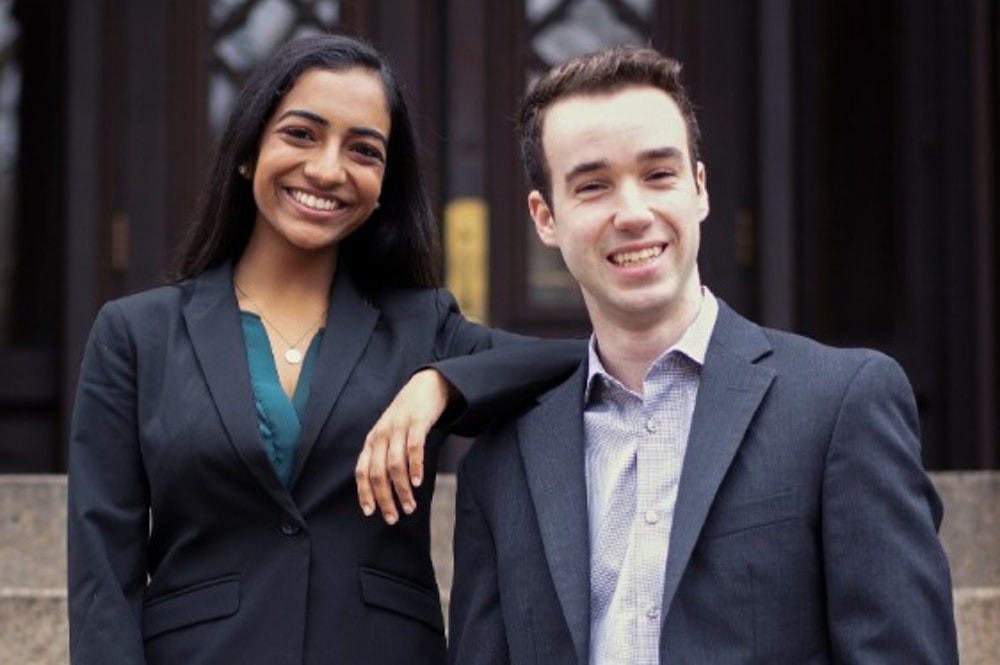Natasha Menon (C ’20) is a regular at the Don Memo food truck, loves to binge Brooklyn Nine–Nine, calls her family’s 10–foot–tall cactus a “pet,” and has recently conquered her fear of cats. She’s also the new president of the Undergraduate Assembly (UA). She wants all Penn students to know that she would love to meet you.
When I sit down with Natasha for our interview, we immediately get into the deep end of school policy at Penn. The student government expert is more than ready to talk about the problems she sees, how she wants to fix them, and exactly what steps she will take to make a better campus experience.
A lot of people might not know what the UA is or exactly what it does. But Natasha’s very willing to tell people why the governing body is so important. She describes the UA as the “policy branch” of the student government organizations: members of the UA act as liaisons between students and school administrators to lobby for changes that improve student life. One of the UA projects she is most proud of is a long–term effort to create a less competitive club recruitment process. Thanks to the UA, all clubs in the SAC Activities Fair will no longer be allowed to ask for resumes, require formal interview wear, or have multi–round interviews starting in the fall.

Ever since Natasha first joined the UA her freshman year, she’s tried in every way to be a “servant leader,” something she first learned during her time participating in Youth in Government—a group similar to Model Congress, Natasha says—and community service in her high school in Arizona. To her, leadership means “listening first and then acting,” or talking with constituents and fostering change around those conversations.
In high school, she got to put this concept into reality by organizing a letter–writing campaign to her local representatives to increase public school funding. She went to a private school very close by, and she felt that the inequities were far too prominent between the two institutions. Ultimately she worked with activists to get over 500 students to send letters. In response to the campaign, the governor proposed legislation to increase funding for public schools.
On top of her high school experiences, Natasha also credits her parents as her prime influencers for her future career in civil service.
“My parents are both doctors, and I think from a young age I’ve always thought of them as incredibly inspiring,” she says. “I realized pretty early on that I didn’t think medicine was my calling, but I still wanted to help individuals. So I kind of carved my own path for how that might happen.”
Even though Natasha had a drive for government and policy in high school, joining the UA at Penn was almost accidental. She’d happened to walk by the UA’s booth during the SAC Activities Fair freshman year and thought she’d go to the first info session to learn more.
“I actually brought my friend Jordan Andrews (C ’20), who was vice president last session, to the info session with me,” Natasha says. “She was my first friend at Penn. We both went, and we just both loved what the UA was about, the projects they were working on at the time, and we thought, why not give it a try?”
Natasha joined the UA as a new student representative and rose in the ranks every semester to become a college representative, the social justice committee director, and finally treasurer in her junior year. She officially became president at the UA’s internal elections on Sunday, April 14, and she’s more than ready to start. Among other initiatives, she hopes to increase spaces for marginalized groups on campus, push for greater cultural diversity in Counseling and Psychological Services staff, and educate students on their academic rights. Furthermore, as a woman of color, Natasha is interested in preserving many cultural spaces on campus.
“If your professor has a class scheduled during a snow day, or if you have an assignment due on a reading day, which is not allowed, where do you go from there,” she asks. “Or even more pressingly, if an inappropriate comment is made in class, or a situation happens, who do you talk to? Someone in power needs to be able to speak up.”
While Natasha’s passion for policy has found its place in the UA, she’s also done a lot of social change in communities beyond Penn, especially in West Philadelphia. As a tutor for Moder Patshala, an educational center for Bangladeshi immigrants and refugees, Natasha works with kids to fill in the gaps of their school education. This program specifically works with students to bring in their South Asian culture into their learning. She says the kids are “so full of life,” and she loves being able to step out of Penn’s environment to address city–wide problems.
Natasha’s also interned at the Public Interest Law Center, where she helped to draft legislation addressing housing issues that affect Philadelphia residents on a daily basis. This summer, she’s interning at the Department of Homeland Security’s Office of Civil Rights and Civil Liberties in Washington, D.C., where she’ll be able to take what she’s learned in Philadelphia and apply it to a national scale.
In the future, Natasha’s hoping to go to law school in the Northeast before possibly starting a career as a public interest lawyer. Eventually, she’s considering running for public office, inspired by the many “women of color paving the way” in the House, Senate, and 2020 presidential campaign.
But for now, Natasha has the huge task of being UA president, and she is ready and eager for the challenge. I ask her what she’s most excited about with being president. She pauses a moment before saying, “I’m excited to just start doing the work.”

